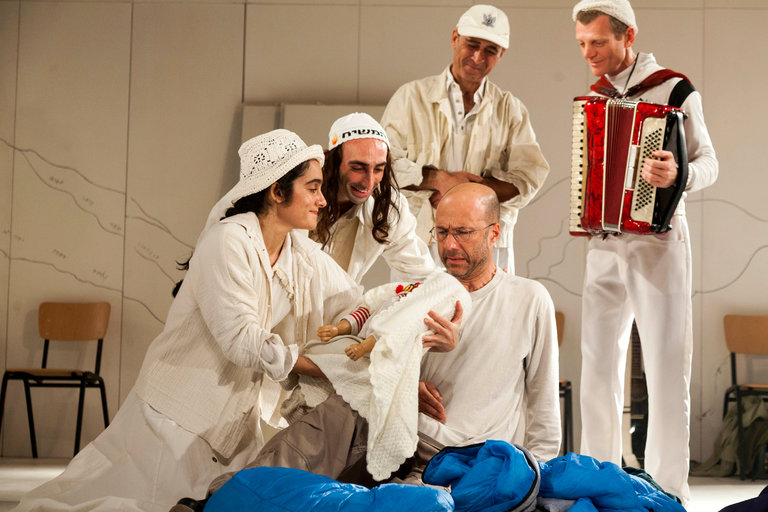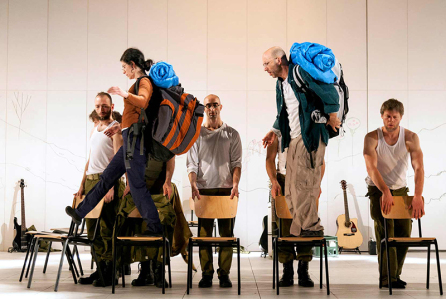

David Grossman’s novel To the End of the Land deals with the aftermath of parents having their children sent off to war. The book was a critical success in Israel and received a National Book Critics Circle Award nomination upon being translated to English in 2010, in the novel Grossman depicts a kind of pain that seems unfathomable: losing a child. And yet, by the time he first published the book, he had lost his younger son Uri in the Second Lebanese War. Reading To the End of the Land, which is both sumptuous and intimate, it’s hard to think of it as existing beyond the realm of the literary, because its emotions are so intricately detailed by Grossman. However, the novel has been adapted into a play by Hanan Snir, artistic director of Ha’Bima National Theatre who in collaboration with The Cameri Theatre of Tel Aviv are presenting the play at the Lincoln Center Festival.
Like Grossman, Snir hasn’t been one to shy away from depicting emotional distress in his work, his productions in Israel are often commended for their emotional journeys and bold, formal approach. But as with most Israeli art they also carry unintended political weight - due to the nation’s ongoing conflict with Palestine - the theatre company has sought protection from the Israeli Security Agency when on tour, and in America, before the Lincoln Center Festival premiere of Land, Pulitzer prize winners and other notorious theatre makers called for a boycott suggesting that the play was perpetuating Israel’s unjust treatment of Palestine.
Speaking to Snir, he wants to talk about the ideas and intentions behind his work, rather than elements outside of his control; the sign of an artist aware that the work stops being his once it’s released into the world. We discussed the process of adapting the novel, why he’s so keen on making art about pain, and how his ultimate message has less to do with building an Israeli brand, and more with a global sense of purpose.
Did you work with David Grossman in adapting the novel into a play?
I didn’t work with David at all when I wrote. I sent him the script just before we started rehearsals, he approved it and the first time he saw it was during the dress rehearsal. David trusted I would do a good job, and I think he liked it very much because by now he’s seen it five or six times.
What made you think the novel would make a good play?
David asked me to adapt another novel of his actually, Falling Out of Time, which he wrote after Land, but the book was so strong and poetic that I felt it would be too much for me to adapt. I didn’t really connect to it, so I didn’t know what to do. I suggested to instead adapt To the End of the Land, and he agreed. It took me about two years to digest the novel, you never know how something’s going to work in the end, but you need to have some feeling about it. I liked the book very much, the three main characters are people who are my age, so I know what the period is like. I was in that world too, I knew the characters, the circumstances and felt I could really understand it and have empathy towards them. I like the characters very much, every time you adapt a novel it’s a subjective interpretation, you choose what’s meaningful dramatically for you about the book, and hope it will also be meaningful to audiences. When I talk about audience I talk about Israel, I can’t tell you about audiences in New York. People were very moved by the play in Israel, they cried, some felt shock, they felt identified with the characters. Once people here identify with it, only then it can become universal.
Were there specific moments from the novel you regretted not being able to work into the play?
I had to neglect or omit stories of childhood for a few reasons, in Israel I can’t employ children under 10 years old, and since the characters in the book were 3 or 4, I didn’t want to have an older child play a younger one. The childhood scenes are very important in the book, they say how the characters were born, what they were like, but I had to omit them and concentrated on Ora and her two lovers. I realized I couldn’t do everything in the book. Most of the novel is about the journey the characters take across Israel, you can do that on film but it’s harder to do onstage. I decided not to be realistic about it, so in our case the stage is empty, there are three walls surrounding the stage, but we have no trees, nature of any kind, but elements that represent it.
I loved Falling Out of Time and the way it’s structured like an epic poem. It’s also a book filled with so much pain. Since you read this one before taking on To the End of the Land, did any elements from the former make it to the structure of the play?
I don’t know, I read it before and discussed it with David, so if any elements came to the play it was an unconscious decision. The book is filled with pain but what I tried to do is to allow the audience to digest it. The play is painful enough, so I added humor, songs, all the actors play musical instruments, so I hope the pain is delivered in a measure the audience can take. Falling Out of Time is obsessed with pain, it’s almost morbid, so it was one of the reasons why I didn’t want to deal with it.

Most of the articles I read about how the play was received in Israel spoke about how audiences there weren’t used to plays with such pain. When did you first realize theatre could channel loss and pain rather than just being entertainment?
I’m not interested in entertaining plays, I’m not interested in comedies or musicals. I directed two operas and one musical, Next to Normal, which is also very painful. It’s a psychological musical and I found it interesting because it didn’t have the stupid stories most musicals have. I’m a therapist, so I liked how the musical dealt with trauma, I knew it wouldn’t be a big hit here, but I really wanted to do it. All my work is about pain, I did the three tragedies, Antigone, Electra, and before To the End of the Land I did Oedipus the King, which I don’t have to tell you about. The prophecy and fate of Oedipus are related to Land, the Hebrew title of the novel in a free translation is “a woman who is running away from the message or from the prophecy”. There’s a similar word in Christianity, something about messages…
I’m not sure what it is…
You’re not a good Christian I believe (laughs).
Not at all, sorry.
It’s OK, I forgive you. Anyway, the woman in the play is afraid of hearing the message that her son died in the war, so she believes if she’s not home when they arrive then it won’t become a reality. If she runs away nobody’s going to knock on her door and then her son won’t die. So back to Oedipus, this is a man who hears the prophecy about him killing his father and marrying his mother, and he tries to run away from it, but it comes true. In a way it’s an unconscious wish, when David Grossman wrote the book he thought it would prevent his son from being killed, and the opposite happened which is absolutely terrible. In theatre we have to suspend our disbelief, in Oedipus everyone knows the prophecy, two thousand years ago people knew about it in the same way we know the Bible. In Israel everyone knew David Grossman’s son had died in the Second Lebanese War, so in a way they had to suspend this knowledge when they saw the play.
The play is making its NY debut in Hebrew rather than in an English translation. What’s the significance of that for you?
For me if the play works in Israel I’ll be proud if audiences outside of Israel identify with the play. It’s important for me to let people know that we no longer want to live in this kind of terror. If the play is universal we have more people who will want to support the idea of peace, of no more war. The point is that this isn’t only in Israel, this kind of terror exists all over the world. Every mother in places like London or New York might get a knock on the door with someone telling them their son or husband have died. Israel is a country of post-trauma, there are so many layers of it. Of course we would want to put an ending to it, if I may speak politically I don’t think our current government is striving towards peace. I’m very anxious about it, but this play, and the book, are not left wing, they’re balanced, you can see both attitudes in the play, Ora’s husband is an army officer and even the son is in the army, he complies with orders, there’s a real argument between them. But the general line of the play is towards saying: we’ve had enough of this.
For more information on To the End of the Land click here.